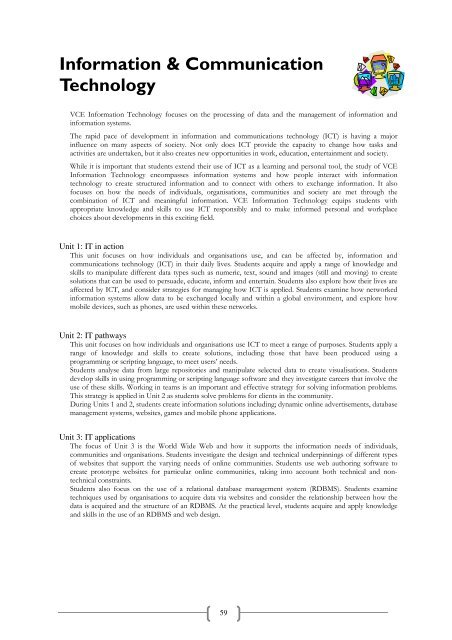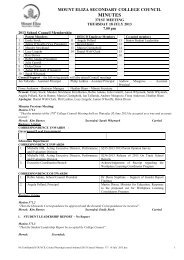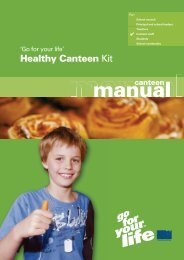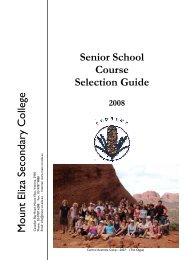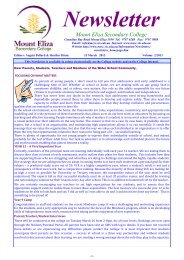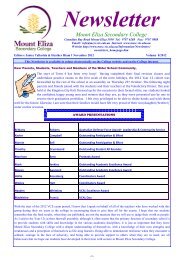9-12 Course Selection Guide - Mount Eliza Secondary College
9-12 Course Selection Guide - Mount Eliza Secondary College
9-12 Course Selection Guide - Mount Eliza Secondary College
Create successful ePaper yourself
Turn your PDF publications into a flip-book with our unique Google optimized e-Paper software.
Information & CommunicationTechnologyVCE Information Technology focuses on the processing of data and the management of information andinformation systems.The rapid pace of development in information and communications technology (ICT) is having a majorinfluence on many aspects of society. Not only does ICT provide the capacity to change how tasks andactivities are undertaken, but it also creates new opportunities in work, education, entertainment and society.While it is important that students extend their use of ICT as a learning and personal tool, the study of VCEInformation Technology encompasses information systems and how people interact with informationtechnology to create structured information and to connect with others to exchange information. It alsofocuses on how the needs of individuals, organisations, communities and society are met through thecombination of ICT and meaningful information. VCE Information Technology equips students withappropriate knowledge and skills to use ICT responsibly and to make informed personal and workplacechoices about developments in this exciting field.Unit 1: IT in actionThis unit focuses on how individuals and organisations use, and can be affected by, information andcommunications technology (ICT) in their daily lives. Students acquire and apply a range of knowledge andskills to manipulate different data types such as numeric, text, sound and images (still and moving) to createsolutions that can be used to persuade, educate, inform and entertain. Students also explore how their lives areaffected by ICT, and consider strategies for managing how ICT is applied. Students examine how networkedinformation systems allow data to be exchanged locally and within a global environment, and explore howmobile devices, such as phones, are used within these networks.Unit 2: IT pathwaysThis unit focuses on how individuals and organisations use ICT to meet a range of purposes. Students apply arange of knowledge and skills to create solutions, including those that have been produced using aprogramming or scripting language, to meet users’ needs.Students analyse data from large repositories and manipulate selected data to create visualisations. Studentsdevelop skills in using programming or scripting language software and they investigate careers that involve theuse of these skills. Working in teams is an important and effective strategy for solving information problems.This strategy is applied in Unit 2 as students solve problems for clients in the community.During Units 1 and 2, students create information solutions including; dynamic online advertisements, databasemanagement systems, websites, games and mobile phone applications.Unit 3: IT applicationsThe focus of Unit 3 is the World Wide Web and how it supports the information needs of individuals,communities and organisations. Students investigate the design and technical underpinnings of different typesof websites that support the varying needs of online communities. Students use web authoring software tocreate prototype websites for particular online communities, taking into account both technical and nontechnicalconstraints.Students also focus on the use of a relational database management system (RDBMS). Students examinetechniques used by organisations to acquire data via websites and consider the relationship between how thedata is acquired and the structure of an RDBMS. At the practical level, students acquire and apply knowledgeand skills in the use of an RDBMS and web design.59


